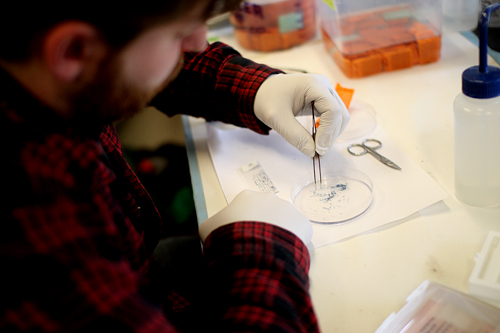A Portland State team recently completed research that shed light on a relevant topic of discourse within the farming world: genetically modified food.
Portland State research team reveals harmful farming practices

A Portland State team recently completed research that shed light on a relevant topic of discourse within the farming world: genetically modified food.
In a study published on April 17 and led by biology doctoral candidate Tanya Cheeke, the team revealed that crops genetically modified to contain insecticides developed from bacteria cause harm to soil ecosystems, contrary to what many corporate bioengineering firms claim. The team reached the results through research that studied the relationships between soil organisms and the roots of plants, both genetically modified and naturally grown.
“In this study, I evaluated nine different lines of corn genetically modified to express Bt insecticidal toxins and non-Bt control lines for their ability to form symbioses with arbuscular mycorrhizal fungi,” Cheeke said.
Bt, or Bacillus thuringiensis, is a kind of bacteria that grows in soil and is commonly used in insecticides. Recently, it has been adapted for use in genetically modified crops. Arbuscular mycorrhizal fungi, commonly abbreviated as AMF, are soil organisms that exist in both naturally grown and genetically modified ecosystems. AMF form symbiotic relationships with plant roots, as they require a plant host for nutrition and reproduction. Cheeke said that she chose to focus on them because she questioned whether or not a change in the physiology of a plant, in this case due to genetic modification, would have any effect on the health of the surrounding soil.
Cheeke and her team acquired the plant products from seed companies and spent the entirety of the experimental process growing, maintaining and processing their samples from greenhouse and field trials. The trials revealed that the AMF did not bond as well with plant roots of the genetically modified samples, thus the surrounding soil for those crops was not as healthy as the surrounding soil for the naturally grown crops.
“In my greenhouse studies, I have found that multiple lines of Bt corn had lower levels of mycorrhizal colonization in their roots, especially under low fertilizer conditions. This is important because AMF tend to provide the most benefit to their host plant when grown in low-nutrient environments,” Cheeke said.
Separate research done by Cheeke also revealed that 88 percent of corn grown in 2011 in the United States was produced with genetic modifications, through use of toxins such as Bt. These results, therefore, could potentially alter the agricultural landscape in the U.S.
Protest groups have been rallying for change in the nation’s agricultural system, promoting the creation of healthier food and a healthier ecosystem. Their targets are primarily big-business agricultural firms.
“Corporate control of our food systems has increasingly harmed people, our ecosystems and our climate. To create healthy local food systems globally we must both create the alternatives we are calling for and resist the corporate and political forces creating toxic, unhealthy, genetically modified food,” said the Occupy Austin protest group via a press release.
“The introduction of genetically engineered foods amounts to a dangerous global experiment by giant transnational biotechnology companies who control large segments of the world’s food supply, including food patents, seed companies and other aspects of the food chain,” said the Natural Law Party in a recent official release.
PSU has joined in these efforts. Professor of biology Lisa H. Weasel wrote the book Food Fray in 2008, which investigates the issue of genetically modified foods. The book won the award for Best Scientific Book at the 2009 Green Book Festival and acts as a valuable source of information and perspectives on the topic.
Students at PSU remain divided on the issue, pointing out that genetically modified crops are difficult to analyze because the data is so new and conclusions are hard to come by based on such a small sample size.
“One side is saying that more control over what’s growing where will result in more control over ecosystems’ evolution. The other side is saying that messing with nature is bad, because it takes away the random genetic drift of plants, and they don’t know what kind of chaos will ensue from that,” said biology junior Laura Klein.
“Humans have been modifying the genetics of our plants and food sources for over 10,000 years. The process of breeding might be considered more natural, but in the end it was humans who created fruits like corn, kiwi, and oranges. Some foods created through genetic modification are healthy; some are not. People are scared of genetic modification because it’s science playing with your food, but we’ve been doing that since the dawn of agriculture,” said biology junior Kristin McKinnon.
“I feel that there are still too many unanswered questions. What is to stop genetically modified plants from pollinating non-genetically modified plants? Are there any known long-term impacts on human health?” said biology senior Kourtney Kuiper.
Cheeke advised PSU students wishing to know more about the topic to visit the official sites for advocacy groups such as the International Service for the Acquisition of Agri-biotech Applications or the Union of Concerned Scientists, as well as the official sites for the Environmental Protection Agency and the United States Department of Agriculture.






The U.S. population has historically placed a considerable degree of trust in the regulatory oversight provided by the U.S. Department of Agriculture and its agencies. There is little tradition of people having a close relationship with their food, with the overwhelming majority of people having bought their food in supermarkets for years. But the 2003 survey by the Pew Research Center showed that even in the U.S., 55% see GM food as “bad” food. A 2010 survey found that over one third of U.S. consumers were very or extremely concerned about GM food, a 3% reduction from 2008.